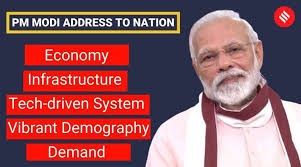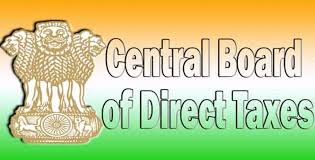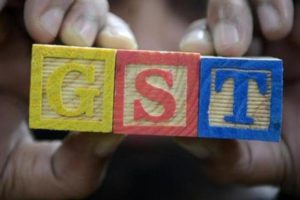
Key Highlights of the Special economic and comprehensive package of Rs 20 lakh crores Announced by the Govt. of India, for relief and credit support related to businesses, especially MSMEs to support Indian Economy, Atmanirbhar Bharat and to fight against COVID-19.
GOI Presentation on Rs. 20 Lac Crore Special Package: AtmaNirbhar Bharat (COVID-19)
Hon’ble Prime Minister Shri Narendra Modi yesterday announced a Special economic and comprehensive package of Rs 20 lakh crores, equivalent to 10% of India’s GDP. He gave a clarion call for आत्मनिर्भर भारत अभियान or Self-Reliant India Movement. He also outlined five pillars of Aatmanirbhar Bharat– Economy, Infrastructure, System, Vibrant Demography and Demand.
During the press conference here today, Union Minister of Finance & Corporate Affairs Smt. Nirmala Sitharaman said in her opening remarks that Prime Minister Shri Narendra Modi had laid out a comprehensive vision in his address to the Nation yesterday. She further said that after spending considerable time, the Prime Minister has himself ensured that inputs obtained from widespread consultation form a part of economic package in fight against COVID-19.
“Essentially, the goal is to build a self-reliant India that is why the Economic Package is called Aatma Nirbhar Bharat Abhiyaan. Citing the pillars on which we seek to build Aatma Nirbhar Bharat Abhiyaan, Smt. Sitharaman said our focus would be on land, labour, liquidity and law.
The Finance Minister further said that the Government under the leadership of Prime Minister Shri Narendra Modi has been listening and is a responsive Government, hence it is fitting to recall some reforms which have been undertaken since 2014.
“Soon after Budget 2020 came COVID-19 and within hours of the announcement of Lockdown 1.0, Pradhan Mantri Garib Kalyan Yojna (PMGKY) was announced,” Smt. Sitharaman said. She further said that we are going to build on this package.
“Beginning today, for the next few days, I shall be coming here with the entire team of the Ministry of Finance to detail the Prime Minister’s vision for Aatma Nirbhar Bharat laid out by the Prime Minister yesterday,” Smt Sitharaman said.
Smt. Nirmala Sitharaman today announced measures focused on Getting back to work i.e., enabling employees and employers, businesses, especially Micro Small and Medium Enterprises, to get back to production and workers back to gainful employment. Efforts to strengthen Non-Banking Finance Institutions (NBFCs), Housing Finance Companies (HFCs), Micro Finance Sector and Power Sector were also unfolded. Other than this, the tax relief to business, relief from contractual commitments to contractors in public procurement and compliance relief to real estate sector were also covered.
Over the last five years, the Government has actively taken various measures for the industry and MSME. For the Real Estate sector, the Real Estate (Regulation and Development) Act [RERA] was enacted in 2016 to bring in more transparency into the industry. A special fund for affordable and middle income housing was set up last year to help with the stress in this segment. To help MSMEs with the issue of delayed payment by any Government department or PSUs, Samadhaan Portal was launched in 2017. A Fund of Funds for startups was set up under SIDBI to boost entrepreneurship in the country and various other credit guarantee schemes to help flow of credit to the MSMEs.
Key Highlights of the Special economic and comprehensive package of Rs 20 lakh crores Announced by Govt. of India (COVID-19)
a) Rs 3 lakh crore Emergency Working Capital Facility for Businesses, including MSMEs
To provide relief to the business, additional working capital finance of 20% of the outstanding credit as on 29 February 2020, in the form of a Term Loan at a concessional rate of interest will be provided. This will be available to units with upto Rs 25 crore outstanding and turnover of up to Rs 100 crore whose accounts are standard. The units will not have to provide any guarantee or collateral of their own. The amount will be 100% guaranteed by the Government of India providing a total liquidity of Rs. 3.0 lakh crores to more than 45 lakh MSMEs.
b) Rs 20,000 crore Subordinate Debt for Stressed MSMEs
Provision made for Rs. 20,000 cr subordinate debt for two lakh MSMEs which are NPA or are stressed. Government will support them with Rs. 4,000 Cr. to Credit Guarantee Trust for Micro and Small enterprises (CGTMSE). Banks are expected to provide the subordinate-debt to promoters of such MSMEs equal to 15% of his existing stake in the unit subject to a maximum of Rs 75 lakhs.
c) Rs 50,000 crores equity infusion through MSME Fund of Funds
Govt will set up a Fund of Funds with a corpus of Rs 10,000 crore that will provide equity funding support for MSMEs. The Fund of Funds shall be operated through a Mother and a few Daughter funds. It is expected that with leverage of 1:4 at the level of daughter funds, the Fund of Funds will be able to mobilise equity of about Rs 50,000 crores.
d) New definition of MSME
Definition of MSME will be revised by raising the Investment limit. An additional criteria of turnover also being introduced. The distinction between manufacturing and service sector will also be eliminated.
e) Other Measures for MSME
e-market linkage for MSMEs will be promoted to act as a replacement for trade fairs and exhibitions. MSME receivables from Government and CPSEs will be released in 45 days.
f) No Global tenders for Government tenders of up to Rs 200 crores
General Financial Rules (GFR) of the Government will be amended to disallow global tender enquiries in procurement of Goods and Services of value of less than Rs 200 crores.
g) Employees Provident Fund Support for business and organised workers
The scheme introduced as part of PMGKP under which Government of India contributes 12% of salary each on behalf of both employer and employee to EPF will be extended by another 3 months for salary months of June, July and August 2020. Total benefits accrued is about Rs 2500 crores to 72.22 lakh employees.
h) EPF Contribution to be reduced for Employers and Employees for 3 months
Statutory PF contribution of both employer and employee reduced to 10% each from existing 12% each for all establishments covered by EPFO for next 3 months. This will provide liquidity of about Rs.2250 Crore per month.
i) Rs 30,000 crores Special Liquidity Scheme for NBFC/HFC/MFIs
Government will launch Rs 30,000 crore Special Liquidity Scheme, liquidity being provided by RBI. Investment will be made in primary and secondary market transactions in investment grade debt paper of NBFCs, HFCs and MFIs. This will be 100 percent guaranteed by the Government of India.
j) Rs 45,000 crores Partial credit guarantee Scheme 2.0 for Liabilities of NBFCs/MFIs
Existing Partial Credit Guarantee scheme is being revamped and now will be extended to cover the borrowings of lower rated NBFCs, HFCs and other Micro Finance Institutions (MFIs). Government of India will provide 20 percent first loss sovereign guarantee to Public Sector Banks.
k) Rs 90,000 crore Liquidity Injection for DISCOMs
Power Finance Corporation and Rural Electrification Corporation will infuse liquidity in the DISCOMS to the extent of Rs 90000 crores in two equal instalments. This amount will be used by DISCOMS to pay their dues to Transmission and Generation companies. Further, CPSE GENCOs will give a rebate to DISCOMS on the condition that the same is passed on to the final consumers as a relief towards their fixed charges.
l) Relief to Contractors
All central agencies like Railways, Ministry of Road Transport and Highways and CPWD will give extension of up to 6 months for completion of contractual obligations, including in respect of EPC and concession agreements.
m) Relief to Real Estate Projects
State Governments are being advised to invoke the Force Majeure clause under RERA. The registration and completion date for all registered projects will be extended up to 6 months and may be further extended by another 3 months based on the State’s situation. Various statutory compliances under RERA will also be extended concurrently.
n) Tax Relief to Business
The pending income tax refunds to charitable trusts and non-corporate businesses and professions including proprietorship, partnership and LLPs and cooperatives shall be issued immediately.
o) Tax related measures
Reduction in Rates of ‘Tax Deduction at Source’ and ‘Tax Collected at Source” – The TDS rates for all non-salaried payment to residents, and tax collected at source rate will be reduced by 25 percent of the specified rates for the remaining period of FY 20-21.This will provided liquidity to the tune of Rs 50,000 Crore.
The due date of all Income Tax Returns for Assessment Year 2020-21 will be extended to 30 November, 2020. Similarly, tax audit due date will be extended to 31 October 2020.
The date for making payment without additional amount under the “Vivad Se Vishwas” scheme will be extended to 31 December, 2020.






